|
|
DMW Special
|
| |
Dear International Digital Health Community,
2021 promises to be a year of higher hopes, as vaccines roll out and help us manage the Covid19 pandemic. Digital tools are also supporting the largest global vaccination program in history with solutions for scheduling appointments, coordinating logistics, documenting vaccination records, and remotely monitoring patients’ health status.
We are convinced that digitization has only just begun to positively impact our healthcare system and we are thrilled to support its further evolution, application, and evidence generation with an entire week of programming: The Digital Medicine Week (DMW).
Starting in just four days, from February 23rd – 26th, we are hosting four interconnected virtual conferences centered around the digitization of medicine. The week’s activities will feature new insights into some of the most pressing topics in digital medicine—for the German healthcare market and beyond:
-
Evidence Con (24.02) – how to generate evidence for and with digital health apps & devices beyond traditional RCTs, including the use of RWE, digital endpoints & more. In the Researchathon (25.02) on the next day, diverse teams from the US & Europe will jointly develop innovative research methodologies. Both the Evidence Con and Researchathon will take place in English and all mainstage events will be livestreamed through the DMW website.
-
MDR Con (25.02) – how will the new EU Medical Device Regulation be adapted to digital health tools like DiGA, including a workshop format to develop best practice.
-
DiGA Con (24.02) – presentation of all BfArM-approved DiGA in the German system by their developers to give a structured market overview for health care providers and insurers.
-
Medical Venture Validation (23.02 - 26.02) – four-day validation program for digital health innovations originating in healthcare practice (led by patients, doctors and other HCPs) with feedback from leading providers, insurers, VCs, and senior mentors.
The Evidence Con and Researchathon will be entirely held in English and are designed to be accessible to international members of the digital health community. All other conferences will be held in German. Registration is free and all mainstage events will be streamed via the DMW-website. Roughly 5000 participants have already registered, our largest event so far.
We hope to welcome many of you at next week’s DMW, stay healthy & optimistic,
|
|
|
|
Figure of the month
|
5.005
participants have registered for Digital Medicine Week from 23-26 February. |
|
hih Events
|
Tuesday, 23 – Friday, 26 February
Digital Medicine Week (virtual)
Information, background, registration: dmw.hih-2025.de
Four days, four interconnected conferences, one goal: improving everyday life for patients.
Be there when the hih opens the digital gates, giving the stage to patients, medical entrepreneurs, DiGA (app) manufacturers, researchers, experts in evidence generation, medical societies, certifiers, and MDR experts. |
|
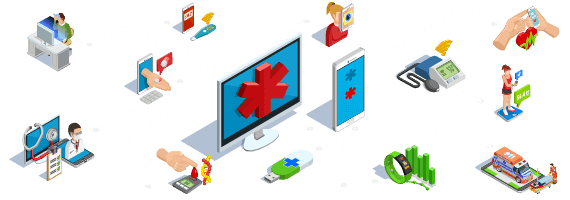
@Special The Digital Medicine Week from 23 to 26 February
|
Medical Venture Validation
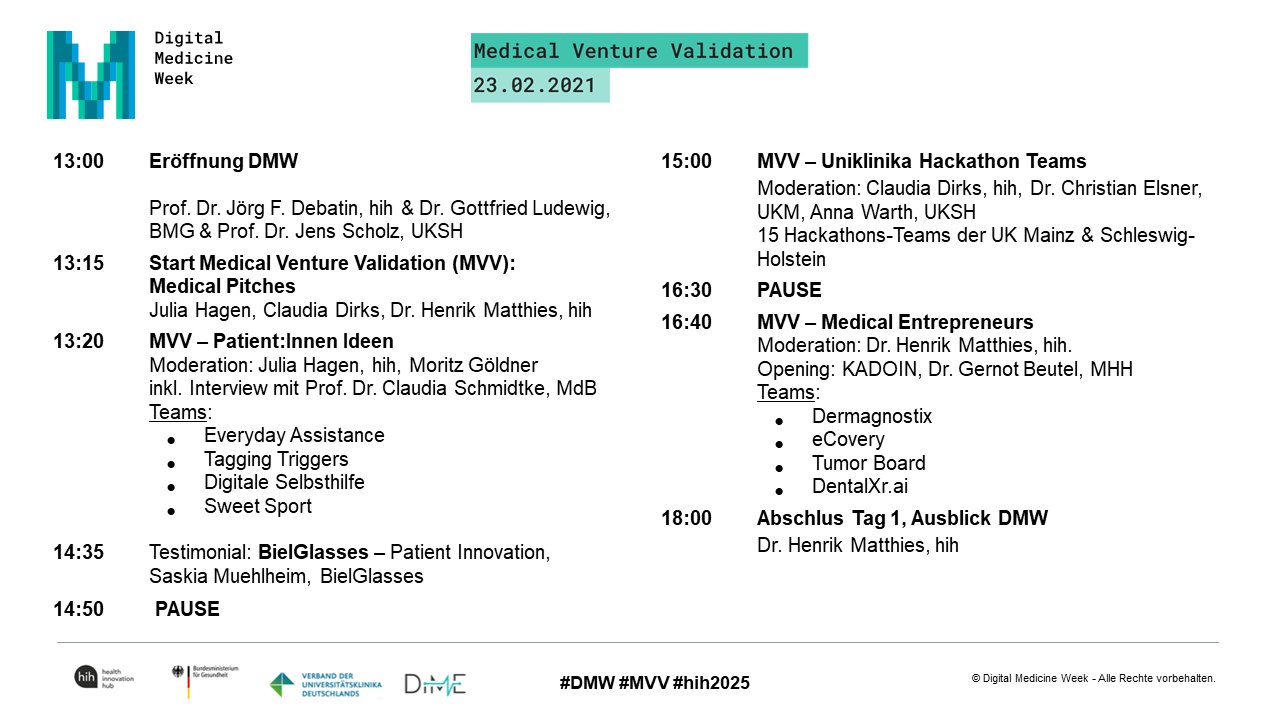
Having an idea is the first step; implementation is typically much more difficult. Medical Venture Validation brings together innovators and implementors to jointly illuminate the daily lives of those living with illnesses, to rethink patient needs, and to realise concrete improvements. This format is oriented towards individuals from all corners of health care and research as well as patients and their relatives, who have a concrete idea for a digital product or who want to improve the lives and participation of individuals with illness through a new venture. The MVV can offer multifaceted support – through reality-checks from patient advocates and medical societies, master classes, and a Pitch Day in front of investors as well as health insurance funds.
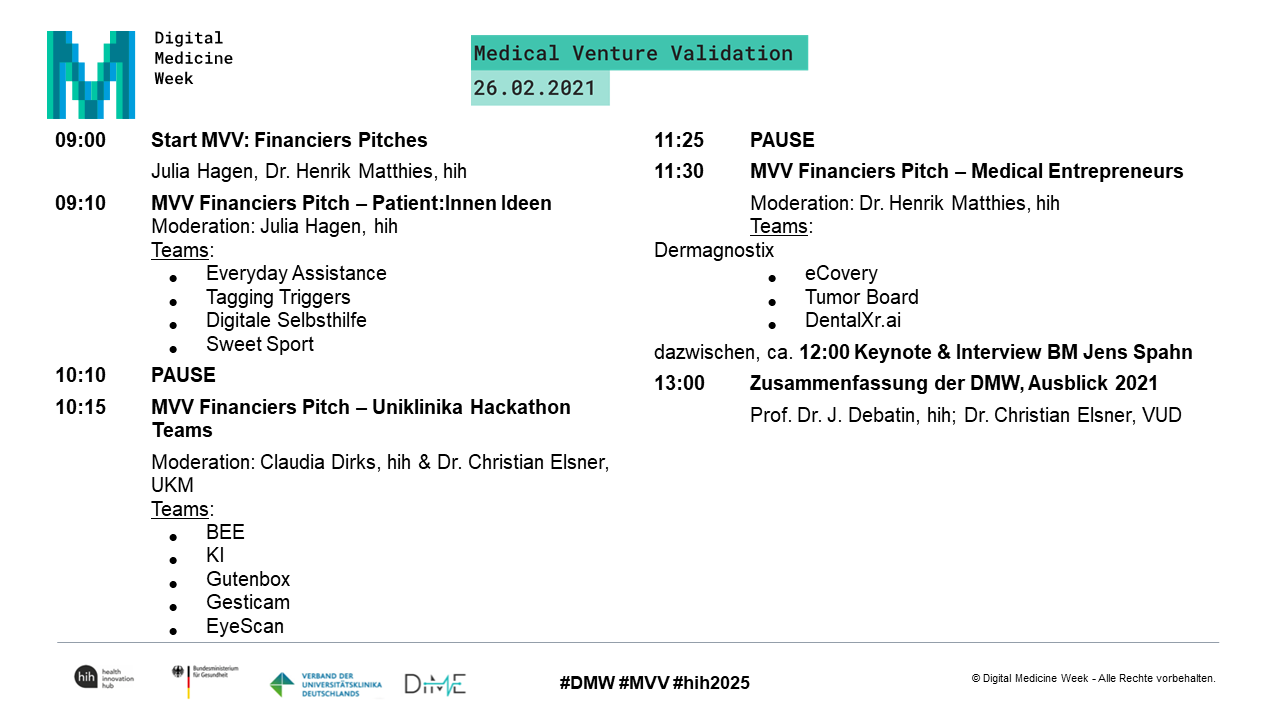
The NUM-COMPASS project
In the run-up to Evidence Con, we will hear from active researchers in the German academic medical community: the National University Medicine Research Network on Covid-19 (NUM), which is funded by the Federal Ministry of Education and Research. NUM was founded to combine and strengthen university knowledge on managing the pandemic. (See interview with Peter Gocke, Charité). The goal of COMPASS is to build a platform for the sustainable coordination of pandemic apps and to provide concrete methods and tools for their implementation according to the state of the art in science, technology and legislation.
The NUM Compass project will be presented during DMW on February 24th at 2pm CET and can be streamed live from the DMW website.
Evidence Con + Researchathon
In addition to eminent innovators and researchers who would like to identify studies, designs, and endpoints during the study period, we welcome other interested participants who are interested in testing their ideas and pursuing proof of concept for promising, but still nascent care hypotheses.
The Researchathon will feature interactive team workshops and presentation of results on Thursday, 25 February.
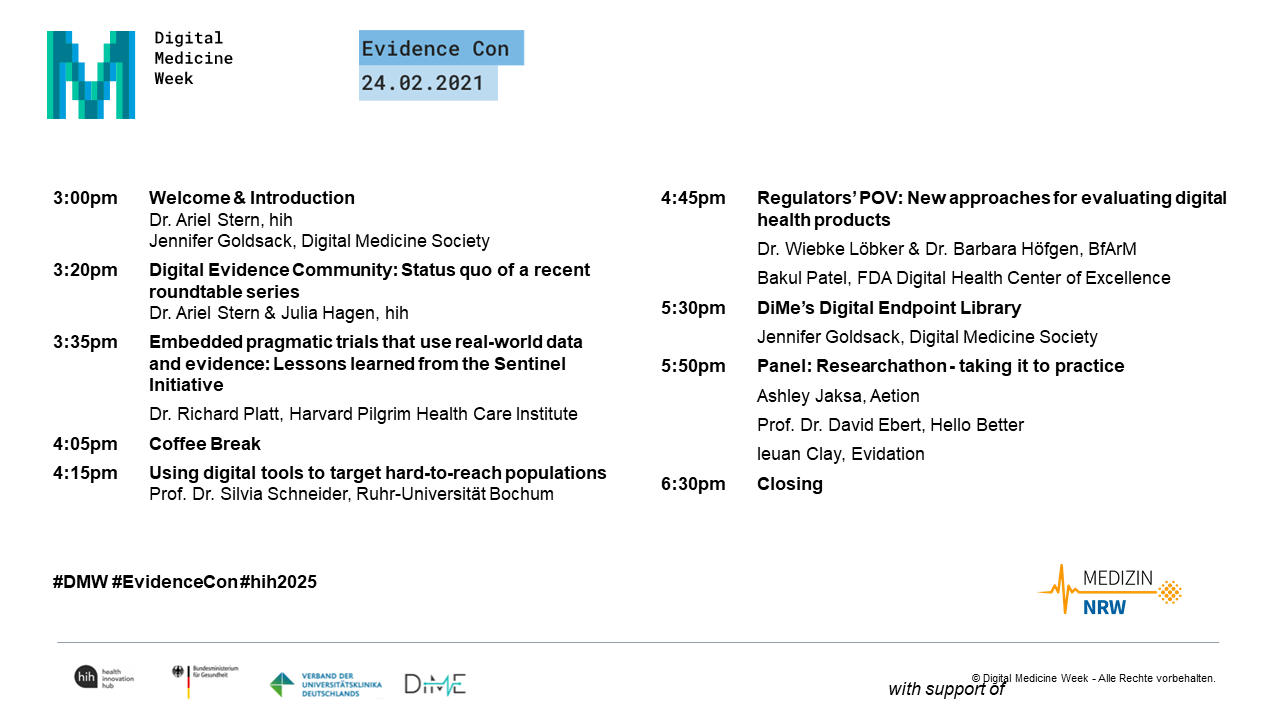
DiGA Con - for manufacturers of prescribable DiGA to-date
As part of DiGA Con, manufacturers of all BfArM–approved DiGA will give structured presentations so that physicians, medical societies, insurers, and patient organizations can get a decisive overview of this new area of health care in a short period of time.
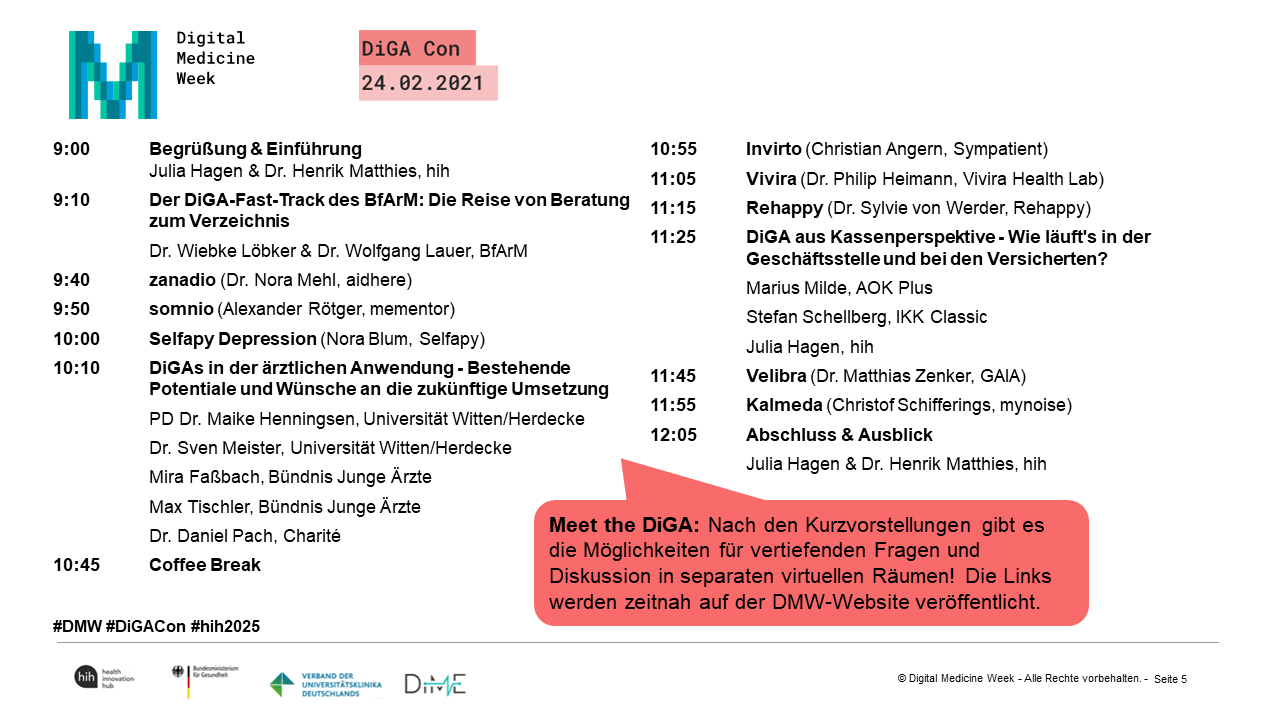
MDR Con and its workshops
The certification of digital medical devices is already a challenge under the MDD and will become even more significant under the MDR. At the MDR Con, experts in medical device certification will come together with digital health entrepreneurs to discuss how agile, digital product development can be achieved within the requirements of the MDR.
The subsequent workshops will focus on developing best practices for compliant processes and technical documentation.
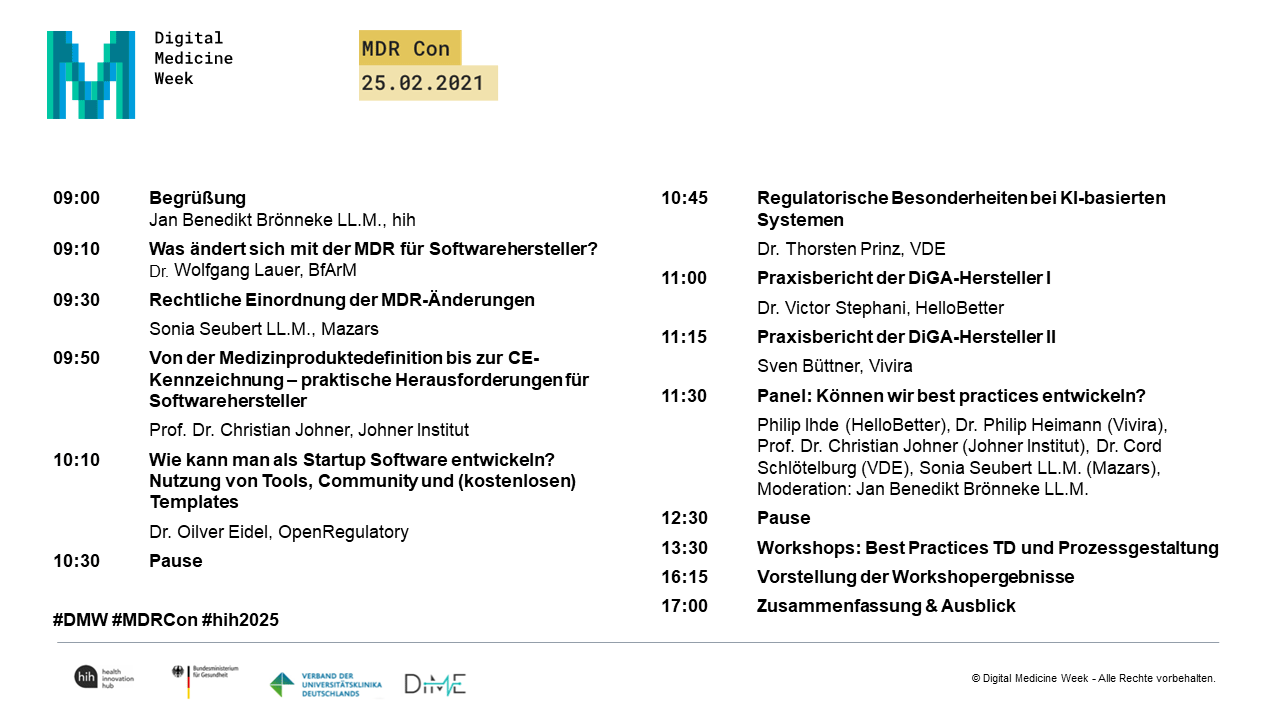
|
|
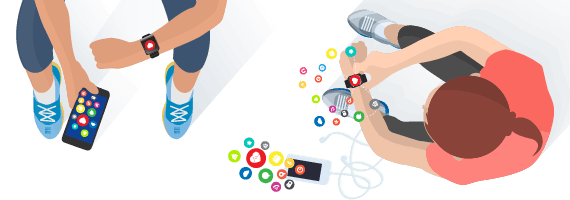
Regulatory Overview
|
The NUM-COMPASS project - research projects, but also practical help
 In the run-up to Evidence Con, we will hear from active researchers in the German academic medical community: the National University Medicine Research Network on Covid-19 (NUM), which is funded by the Federal Ministry of Education and Research. NUM was founded to combine and strengthen university knowledge on managing the pandemic. A conversation with Peter Gocke, Head of the Digital Transformation Unit at the Charité and Member of the steering committee of NUM-Compass, about bringing scientists together during the pandemic: In the run-up to Evidence Con, we will hear from active researchers in the German academic medical community: the National University Medicine Research Network on Covid-19 (NUM), which is funded by the Federal Ministry of Education and Research. NUM was founded to combine and strengthen university knowledge on managing the pandemic. A conversation with Peter Gocke, Head of the Digital Transformation Unit at the Charité and Member of the steering committee of NUM-Compass, about bringing scientists together during the pandemic:
Isn't it quite common for university hospitals to set up and execute joint projects? What is remarkable about the NUM Compass project?
It is indeed not unusual for university hospitals to set up joint research projects. However, the NUM Compass project is not just a research project, but also aims to contribute to concrete medical assistance, for example in pandemic situations. I find this aspect in particular—that research and medical care are moving much closer together—quite welcome. In the NUM Compass project, not only university hospitals, but also IT service providers and other research institutions have come together to collaborate within a short time.
What was the trigger for this research project?
The COVID-19 pandemic has triggered support activities in many areas to combat the pandemic. Among other things, quite a few programmers have invested time and effort to develop a large number of apps - for example at the Healthcare Hackathon Berlin and Mainz in 2020. Apps can certainly be a very helpful and valuable tool, but only if they are also widely used - a good example of this is the “Corona-Warn” app [which was developed for the German market and now has over 25 million downloads]. As such, the idea behind the Compass project was to create a base for supporting the use of apps through the publication of best practice approaches, including data protection considerations and methods and tools for (as far as possible) ensuring interoperability and standardised data use.
To what extent are international medical professionals and scientists invited to participate?
The results of the Compass project will be published and the tools developed will be made available open source—including the corresponding documentation in English—when possible, without exceptions. In doing so, the project wants to ensure that both national and international physicians and scientists have the opportunity to use the output of the project—including in the context of further developing their own projects.
Will the platform continue to exist and be justified after the pandemic?
On the one hand, we are currently seeing that the current pandemic will keep us busy for much longer than some might have hoped at the beginning. In addition, other viruses around the world also have the potential to trigger a pandemic. As such, I believe that our platform will continue to have a use-case and will endure.
In addition, the pandemic has also shown us how valuable and important it is to be able to collect high-quality medical data quickly and with opportunities for joint evaluation. In this respect, we will certainly also see the use of apps outside of pandemic situations in other areas of medicine. Here, too, the output of the Compass project represents a valuable contribution to facilitating the development and use of apps in everyday medical practice.
|
|
Everyday Mood Booster
|
For parents with an (unnecessary) guilty conscience
Video games can promote mental health. This is the reassuring result of a new study by the University of Oxford: people who play "Animal Crossing" or "Plants vs. Zombies: Battle for Neighborville" were happier—in fact, the amount of time spent playing was found to be “a small but significant positive factor in people’s wellbeing.” For the study, the researchers used real game data for the first time. However, the study also points out that the results may not apply to all games - more evidence is still needed |
|
Good News
|
No deaths among more than 500,000 vaccinated individuals: Data from Israel provides hope and optimism in the fight against Covid-19
Israel leads the world in Covid-19 vaccination rates; the country has already fully vaccinated more than half a million people with BioNTech/Pfizer's vaccine. However, the country is not only a leader in vaccination, but also in the provision of data on vaccination progress. According to preliminary figures, the vaccine is highly effective, as Times of Israel reports. Of the 523,000 people insured by the Maccabi health insurance company who have already received two doses of the vaccine, only 544 subsequently were found to be infected with Sars-CoV-2, representing an infection rate of just 0.1 per cent. Of these, only 15 individuals had to be treated in a clinic, with just four individuals experiencing severe illness and the others having only mild or moderate severity. None of the infected individuals died. In contrast, of the 628,000 unvaccinated members of the same insurer, 18,425 were confirmed infected over the same period of time—almost a 3 per cent infection rate. Among the very old and higher risk groups, almost all Israelis have now been vaccinated.
Unfortunately, a new problem is now emerging: many younger Israelis are falling ill with Covid-19 (and those with severe cases require hospitalisation) because they believe they do not need a vaccine. In Israel, everyone over 16 can be vaccinated; the success of the world’s leading vaccination campaign will depend on whether they do so.
An English-language version of the ‘DiGA Vademecum’ will be out this Summer. Advance orders now possible
Our colleagues who helped shape the development, setup and integration of the DiGA Fast Track have written a comprehensive handbook for digital health founders and aspirants to better understand the German healthcare system overall, and the new digital opportunities in particular.
This summer, the English-language version of the ‘DiGA Vademecum’ will be in stores as both a paperback & ebook. Advance orders are possible starting today, e.g. at Barnes & Nobles or directly from the publisher MWV.

|
|
Please take good care of yourself & those around you!
Dankeschön. |
|
|
|
|
|
|